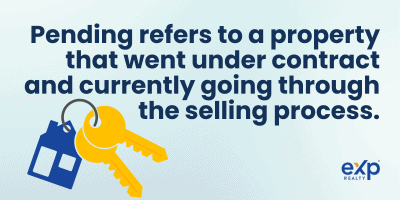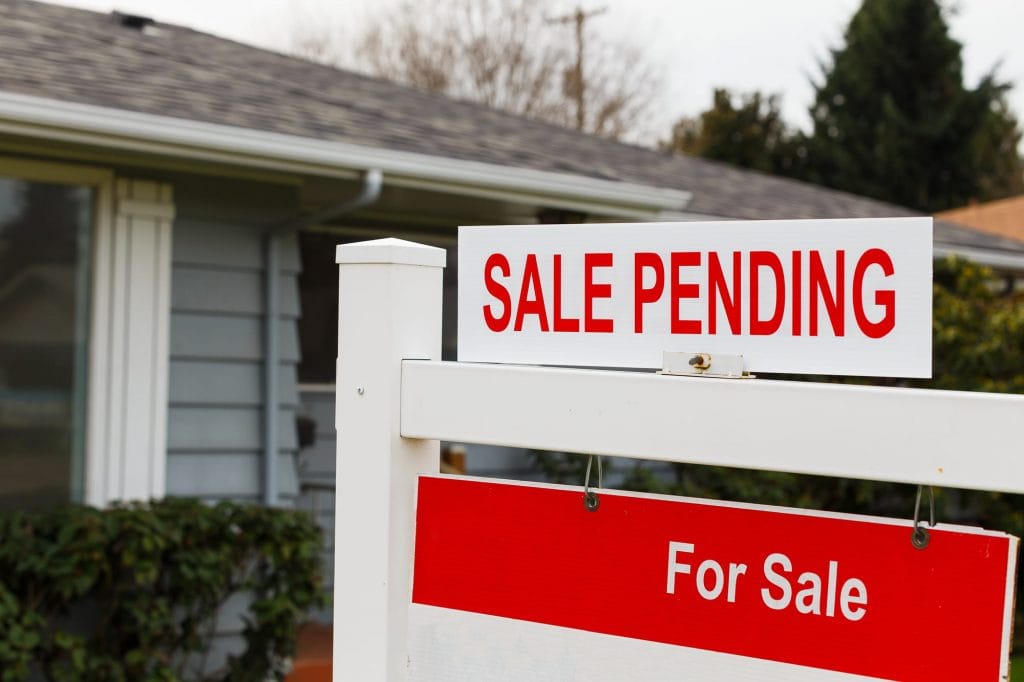What does “pending” mean in real estate? Going through real estate listings takes time, especially considering your options. You’ll need to visit real estate websites, see what people list, and keep track of any homes that go off the market, so you don’t waste time with them and try to purchase homes you can’t get.
As you start your search for real estate for sale in San Jose, CA, or anywhere with a competitive market, you may encounter pending homes. As you see pending offers and similar phrases, you’ll wonder what they entail, so ensure you understand what they mean and know what to do during your search.
What Does “Pending” Mean in a Real Estate Search?
Pending refers to a property that went under contract and currently going through the selling process. If the house becomes pending, the seller finds a buyer who wants to purchase the home, so they work through the details with the real estate agents.
The home won’t switch to this status unless they reach a real estate deal, indicating they have the contracts ready while the parties sign and go through them. They have plans to sell the house and have gone through most of the process, so they want to put it on hold.
However, pending doesn’t indicate the finalized sale contract, so they must go through the processes. Since they still need to complete it but plan to finish the pending home sales, they’ll keep the listing up, so they don’t have to re-create it if the sale process falls through.
Why Is It Important to Understand “Pending” in a Real Estate Search?
You want to understand pending in the real estate market for the following reasons:
- Navigating competitive markets
- Make decisions during your search
- You could submit an offer
- The status could impact your search
You’ll need help narrowing your search while navigating a buyer’s market. If you know homes sell quickly in the area, especially with an excellent selling price, you learn to focus on other homes rather than the pending ones.
Looking through the listings, you can make informed decisions based on the pending status. For example, suppose you end up in a fair market. A pending status doesn’t mean you won’t get the home, so you could watch it before the home purchase contracts go through.
Even if you see it listed as pending, that does not mean additional offers won’t be considered. You can submit backup offers, so they can fall back to you if the first one falls through. You’ll notice backup offer pros, such as them contacting you if it doesn’t work out or having additional properties you can consider during your search.
Pending listings can also impact your search. For example, if you only see one or two homes in the area with pending listings, you may want to ignore them. If most homes have pending statuses, you should talk with the homeowners about pending offers to see what you can find.
Why Are Homes Listed as Pending?
If you see a pending listing, they must finish the home-purchase process before finalizing the details. In addition, they may need to complete common contingency points before they can approve the sale.
- Inspection contingency
- Financing contingency
- Contract contingencies
On top of that, some buyers will try to negotiate the sale price to get a better deal. Doing so can help them lower the purchase price so the two parties find an agreed-upon sale price to make both sides happy with the purchase.
The contingent status could also be from a mortgage contingency. That means the buyer may need to talk with their lender to ensure they can get the verified amount before they go through with the sale.
They also may have contingent property because of a contract. The parties either need to read and sign the contract or wait for it to be adjusted based on the current terms. Once the contingency period ends, they may move to another buyer or look into more options.
In short, listing a home as pending allows sellers to let potential buyers know they don’t have the house under contract yet, but they intend to react to that step.
Can a Pending Sale Fall Through?
A pending sale can fall through, meaning they must complete the real estate transaction. In the meantime, issues can occur with the buyer or seller. Even with an earnest money deposit, such a fall-through could cause the home to return to the market.
The current buyer or seller could run into multiple issues causing the sale to fall through.
- Loss of income
- Buyer’s remorse
- Low appraisals
Unfortunately, losing income remains one of the most common reasons a person may back out of the closing process. If they lose their job right before they finish the sale, they’ll need to stop searching and look into other options to ensure they can afford other active listings.
Even if the buyer reaches a purchase agreement, they could face buyer’s remorse before the title check. However, if that happens and they don’t have a binding contract, they can still back out of the original deal and continue their house-hunting efforts.
While those aren’t the only reasons the listing agent may place the home back on the market, you may see it occur. If they return to the market, the client wants to find more prospective buyers, so they’ll look for people again and seek to sell their home.
The same can occur if the home faces inspection issues, causing the appraiser to identify structural issues and other problems that lower the value. The original buyer may leave the current deal if the house has an appraisal contingency.
Can You Make an Offer on a Pending House?
Usually, you can’t make an offer on a pending house since the seller plans to stick with the current buyer and complete the sale. However, issues can arise during the transaction process, so you could follow a few steps to become a backup option for a pending home.
- Contact the realtor
- Talk about a backup offer
- Make yourself an option
You should see if you can find the buying realtor’s contact information by going through the listing status. You’ll usually find an email address or phone number, allowing you to call the realtor and talk with them about the situation.
Start by explaining that, even though the house is pending, you’re interested in offering a backup offer. If you do, you may need to verify your mortgage approval or access to a mortgage loan to prove you can pay the offered amount.
If the real estate agent feels you can work as one of the backup offers, they’ll add you to the backup buyers. You may need to provide more information, such as your credit score and financial situation, but you could become the go-to backup option if the sale falls through.
How Long Do Homes Stay Pending For?
The pending status varies based on the home, though most remain pending between one week and two months. Interestingly, as you go further into the year, more homes become pending, meaning you’ll have fewer market options than new listings.
You usually won’t want to pay as much attention to recent pending homes. However, if the home has been pending for nearly a month, you have higher odds of securing it since more contingencies arise, making the buyers turn to secondary buyers.
In short, you should note when homes become pending and monitor them. If they remain pending for a while, consider it, but ensure you focus on homes currently on the market that want an initial deal and offer.
How Can You See If a House for Sale is “Pending”?
You should check if a status falls under pending. If you go through homes at eXp Realty, you can click the more button followed by the listing status. After you do so, it’ll show you whether the home has a pending status or is under contract.
If look at a single property, you can check the MLS status in the pending section’s right column. Some websites may also display the current condition when you click on a property, allowing you to check them and see which ones fall under pending.
You can also use filter tools with some sites to find pending homes you want to look through. You can look for homes in a particular area, indicate if you want to view pending homes and go through the options to identify the exact homes you want to see during your search.
Tips for Navigating the “Pending” Status in Your Real Estate Search
As you continue your real estate search, you’ll naturally come across pending homes, so you’ll want to know how to work around them. Ensure you utilize the listed tips to work around the homes for sale and see which ones you can secure as your new home.
Remain Open-Minded and Consider Options
While you go through homes on the market, you’ll come across some homes with a pending status. You may even come across one you view as your dream home, so you become discouraged or upset if it changes to the pending status before you can visit the home.
Instead of fixating on the home and hoping it works out, you must go through others and look through the choices. Many homes in the same areas have similar designs and can vary in price, so it doesn’t hurt to go through your options and see what you should consider.
Even though the home could return to the market, you shouldn’t expect it to happen. Instead, see which properties appeal to you, list your favorites, and start your first-time buyer search.
Communicate With Your Real Estate Agent
While you may feel tempted to find a home without a real estate agent, you’ll enjoy multiple benefits if you work with one.
- Know the local market
- Seek better deals and offers
- Avoid rip-offs and buyer remorse
As you go through the search, you can inform your real estate agent about what you want from a home. Doing so will allow them to narrow the search and point you in the right direction, so you’ll find the home you want on the market.
They can also let you know how pending homes usually play out, so you’ll know if you should bother with them. You can receive their guidance and understand the best steps to take to get a house.
Potentially Submit Offers to Pending Properties
Even though a home falls under the pending status doesn’t mean you can’t seek out options. Depending on the terms and conditions tied to the contract, you could submit an offer to the seller and their real estate agent to review your options concerning the property.
They may have plans with the current choice, but they can turn to you as an additional choice if the first buyer doesn’t work out. Since pending properties fall through, some may seek backup options as long as they make the status clear and don’t make promises.
Before making such an offer, see if you can review the conditions and contract. Doing so will help you avoid committing to a home and finding out the agreement doesn’t suit your needs or expectations.
Keep Yourself Up-to-Date
As you go through real estate, you’ll want to search the various available options and determine the best homes on the market. If you keep yourself informed, you can see when the statuses of your ideal homes change and decide on your next action plan.
You can even add pending items to your consistent searches to see if the pending status changes. If the house sells, you don’t have to worry about it anymore, but if it re-enters the market, you can act quickly and see if you can secure a deal.
Ensure you check the home statuses daily, so you’ll know if anything changes. Doing so matters even more for an area with mostly pending homes, allowing you to try and get the house before anyone gets it first.
Key Takeaways
So, what does pending mean in real estate? As you get involved with real estate searches and look through the homes on the market, you’ll want to understand what pending means. You’ll understand the definition and how to deal with contingencies and see why they matter during your search.
You can then see why homes receive a pending listing, that it can fall through, and that you can potentially make an offer on a pending home. You’ll also understand the average time a home remains pending and some tips to navigate these pending homes in real estate searches.
If you plan to go through a real estate search, you should work with a real estate agent. They’ll help you through the process, identify the best options, and secure the perfect home. That way, you can remain open-minded while you go through the process.
FAQs What does Pending Mean In Real Estate
You’ll naturally form questions while reviewing your options as potential buyers, so you’ll want to review the frequently asked questions (FAQs). As you do, you’ll find answers to those questions and make the home-buying process easier.
What does pending mean on a house?
Pending means they plan to sell the house to someone, but haven’t completed the closing process. Once they finish the purchase or it falls through, they’ll update the listing service accordingly to keep you informed.
Can a house come out of pending?
Yes, when a home comes out of pending, it usually becomes completed and delists, or it goes back on the market. That depends on whether they finished with the closing costs, signed the contracts, and officially sold the home to the new buyer.
How to search for homes listed as pending?
Most real estate search websites will allow you to narrow your search and find the pending options. You can click on the advanced search terms, pick the listing status, and specify if you want to see the pending homes, allowing you to look through them.
How to receive email alerts for homes pending in my neighborhood?
Email alerts usually vary based on the website you use. However, you can set it up to automatically receive email alerts about homes in your neighborhood, the area, and specific homes you follow.
How long do most houses stay pending?
Since a home will become pending within a week, they usually don’t stay pending for a while. Most homes can get sold in under a month, though some may take a bit longer based on the circumstances and if significant issues arise.
You can expect them to stay pending for up to two months.
Is it worth looking at a house that is pending?
It never hurts to keep your eye on a home with a sale pending, though you shouldn’t get your hopes up. Don’t do further research, but see if it happens to re-enter the market, so you can seek it out if you want it.
Why would a house be pending for so long?
Sometimes, homes are pending for extended periods if the buyer or seller faces issues. For example, they could deal with appraisal, financing, and even title issues, so it varies and may last longer than expected.









